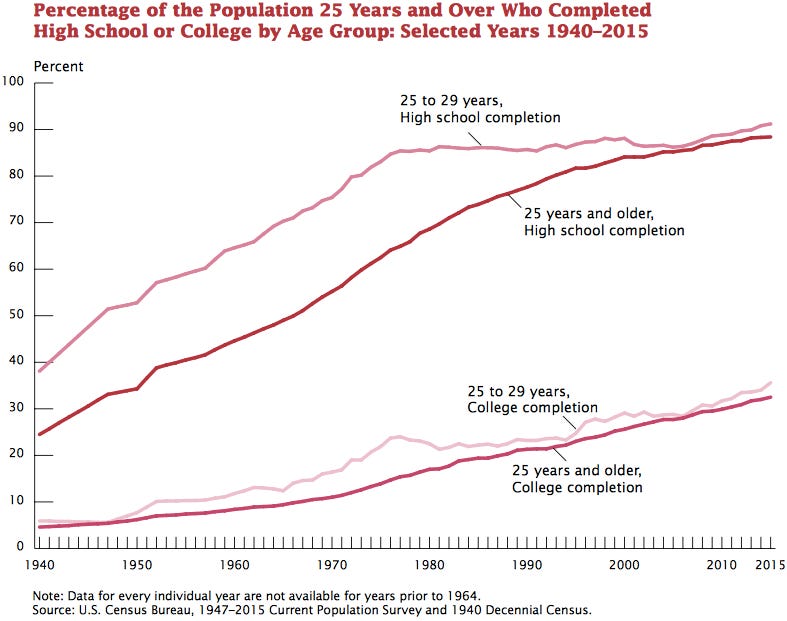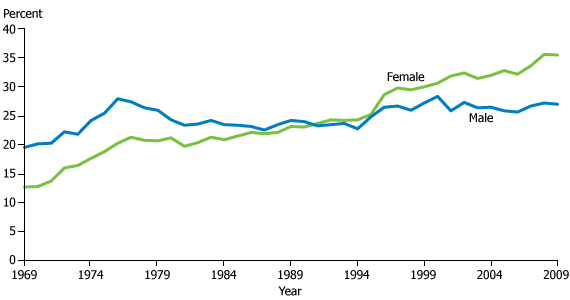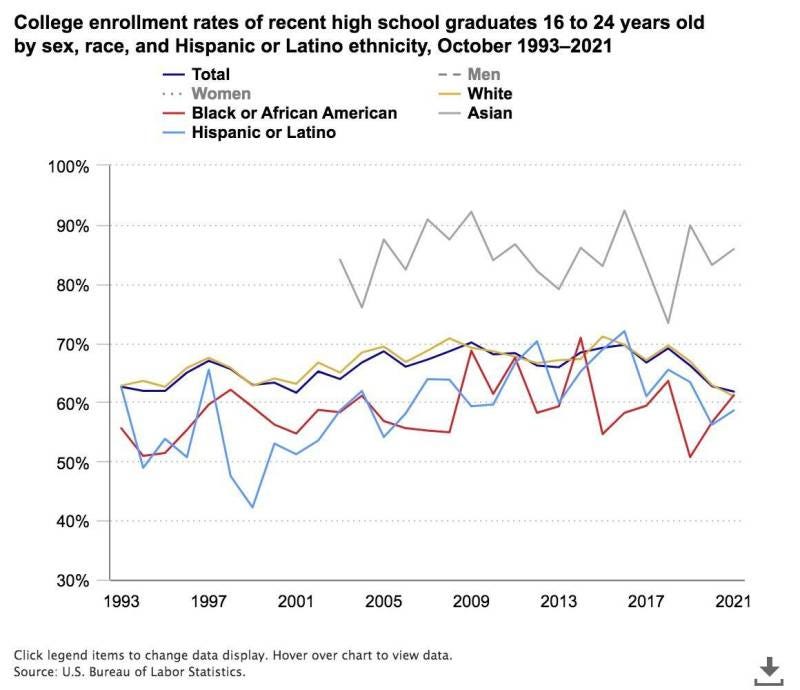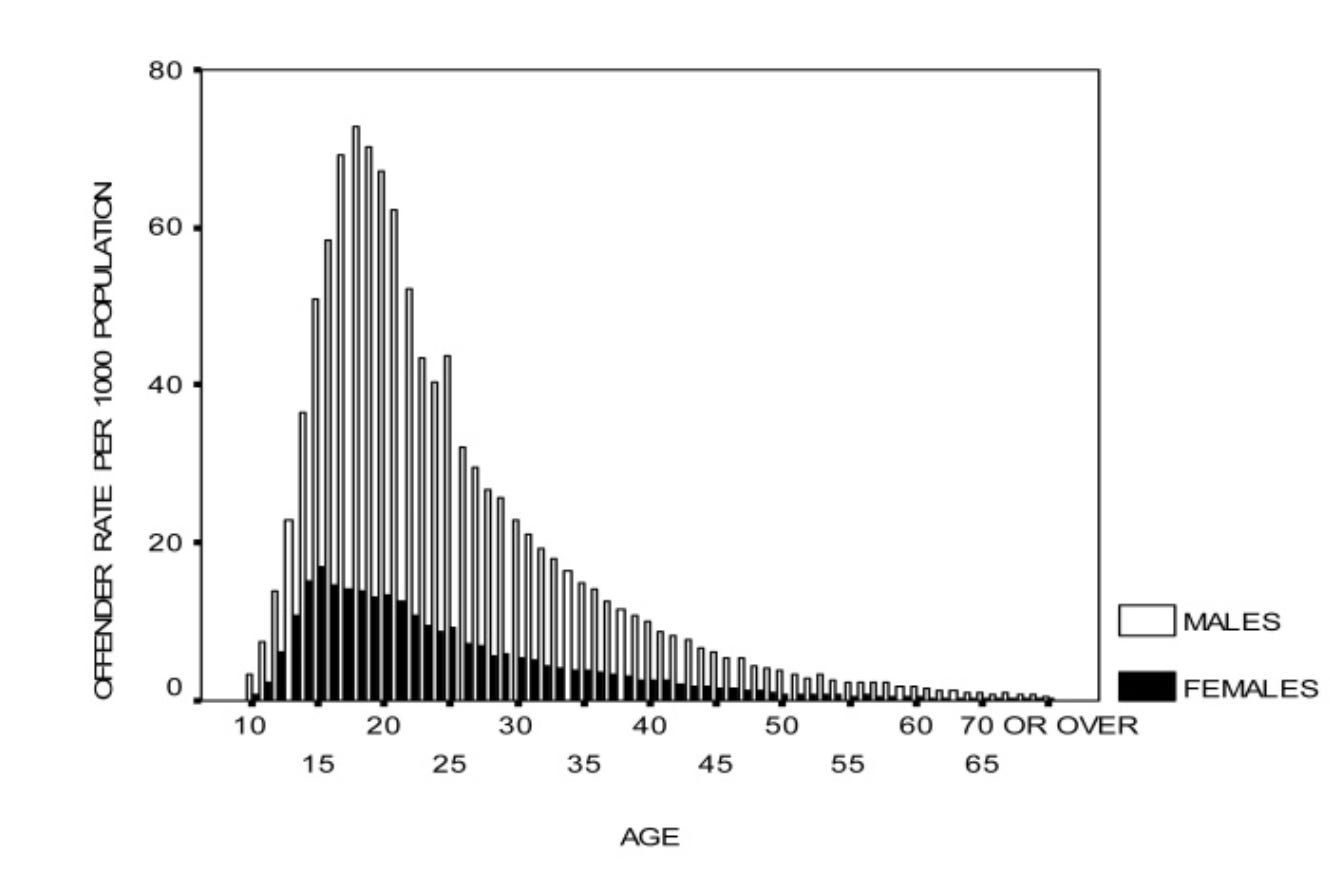Signaling in The Case Against Education
Education isn't about signaling, it's about the right tail paying for the median's teenage quality of life
I first read Bryan Caplan’s The Case Against Education when I was in high school and had just begun to work on my first book. His argument didn’t shock me — I already knew education, especially at the high school level, was largely a waste of time. By my own calculations, I learned nothing of value aside from some math, taught at a pace at least twice as slow as it could have been, and maybe some writing skills, mostly because I took two years of an intense writing course that only had the top 1% of students at my school in it.
I use none of what I just called “useful” at my job, so I’m being extremely gracious with my judgement. That said, it’s obvious only the top 10% of people at most will find math and writing beneficial. The math I learned only served as a gateway for what I do now, which is mostly mathematical statistics, and it only started to become interesting with calculus, which, due to its “complexity”, my school struggled to find a teacher for, even though it was certainly an above average public high school. And most people probably shouldn’t become hobbyist writers (myself included), because almost nobody reads and when they do read nobody really appreciates it, and when they do appreciate it almost nobody pays for it.
I also took four years of Spanish classes, but that was not useful. Today I helped an old tourist out in German, because I taught myself German using Anki, which was not used in my Spanish classes. I am learning French using the same method, because my wife is French. I’ll probably never speak Spanish, because if I keep devoting time to learning foreign words, I’d rather learn the ones Japanese people use than the ones Mexicans use. My takeaway is that high schools shouldn’t teach foreign languages, because they only teach students how to not learn a language, and students will probably pick the wrong one anyway (my school also offered French and German classes).
Anyway, Caplan’s arguments are common sense for smart people with eyes that see and ears that hear. He’s certainly not wrong in any major way. It’s a well written book too — I enjoyed it a lot at the time, it got a lot of attention, I even recommended it on the back cover of my first book. But there’s one part of it that never sat right with me, and that’s the signaling argument.
The Two Meanings of Signaling
Caplan uses signaling in two ways. The first I have no issue with. It’s simply the amount of the education wage premium that is not caused by skills gained at school. For example, if 23 year olds with only high school diplomas make $40,000 per year on average, and 23 year olds with bachelor’s diplomas make $60,000 per year on average, then the wage premium for a bachelor’s diploma is $20,000. Caplan defines the premium as 0% signaling if the entire extra $20,000 is caused by the degree. In other words, if you ran an experiment with college-bound 18 year olds, and prevented half of them from going, and then granted them a fake diploma that’s impossible to tell from the real thing on paper, they would make on average $40,000, while those who were actually trained would make $60,000. If it’s 50% signaling, then the uneducated group would make $50,000 on average, if it’s 75%, they’d make $55,000, and so on.
Defined this way, the signaling coefficient is self-evidently high. In fact, I’d say it’s actually around 100%. I learned barely anything relevant for my job in my computer science degree. Part of this is because I’d already taught myself the first five or so courses in middle school: general programming, object oriented programming, how to use Linux and bash, basic data structures and algorithms, and computer organization. The other reason is that most jobs are web development, so I mostly work with self-taught HTML, CSS, JavaScript, and networking knowledge. I never took a course in any of these, my degree was entirely low level C & assembly content.
If I’d been chosen for the fake degree, I would have taught myself the lucrative web knowledge during my four years of waiting, and I’d have the same marketable skills when I received my fake sheepskin. My wages and career trajectory would therefore not be affected.
I’m willing to accept that for some students, mostly with IQs of between 115 and 125, a university STEM major might only be 80% signaling, since they might struggle to teach themselves the basics on their own. But most of the program is still not relevant to actual jobs, and these students are the least equipped to do good work in traditional, theoretical subjects like algorithm design and operating system development. Having spoken to physical engineers, I hear mostly the same — the course content is irrelevant to the actual job, far too many math problems when most of them end up writing some kind of code or just using templates to do their jobs. Lawyers do no actual law work in university and so can just study for the LSAT; the same is true for medical doctors, who will mostly be skipping chemistry labs that have nothing to do with cutting people open or prescribing antibiotics and amphetamine to children.
That leaves all of the people who shouldn’t be in university at all, along with the future academics. Caplan admits that university is kind of like an internship for future professors, but that’s a very small minority of people, and it means, at best, university is a self-licking ice cream cone. It, at best, only trains people to become future staff of itself, which in turn fail to train anybody to do anything but be future staff of the university system. Even here, the system is at least 50% signaling, and probably more, since actual professors do research and teach in a certain field, but a bachelor’s degree is half non-major coursework, and the other half isn’t going to be entirely useful for a future research career.
All of this is great. But Caplan uses signaling in another way, which is as an explanation for why we have so much school. Individuals go to school, claims Caplan, to signal. The government funds school so much, he says, because people want cheaper access to signaling. But this means more people signal, so everyone has to signal longer, just to get a job.
The first sign that this is not the case evaded Caplan because he has never been in the “real world”, aka private industry. He says:
Does this book advise you to cut your education short, because you won’t learn much of value anyway? Absolutely not. In the signaling model, studying irrelevancies still raises income by impressing employers. To unilaterally curtail your education is to voluntarily leap into a lower-quality pool of workers. The labor market brands you accordingly
It doesn’t work this way at all. In fact, it’s a schoolboy’s point of view that missing a diploma is a forever-mark on your permenant record. At least Caplan does say he’s been in school for over 40 years in his introduction! One reason I dropped out of a PhD program is that I learned that years of experience in a career are much more valued than diplomas, not only PhDs but also a bachelor’s degrees. I feel like a child now if I mention too much college on my resume. I graduated two years ago and I’d leave it to one line: B.S. Computer Science. I probably don’t even need that. High school stuff might as well come with a picture of me as a baby and a letter of recommendation from my mom. And I was valedictorian!
So, people don’t go to signal. Then why do people go? Let’s think about what we mean by “people”. That’s the second thing that is conspiciously absent from Bryan’s book. It’s not just anybody who goes to college. It’s teenagers.
In the US, these teenagers are still basically half minors. Not only can they not drink, they still face plenty of labor restrictions. These include the following:
Interstate truck drivers must be 21
Pilots must be 23
Police officers must be 21
Armed security guards must be 21
In many states, you must be 21 for jobs dealing with gambling, alcohol, tobacco, or gun sales
But I’m not saying they go to college because of these restrictions. Rather, I think they go because of whatever is behind these restrictions. The first two years of university are not even focused study, it’s just broad high school style humanities and general science. Relatedly, I was thinking recently, before I was inspired to write about Caplan’s book, how I’m glad I quit my PhD, because professors are just smarter high school teachers than teach teenagers random math or whatever. Their only official duty is to teach 19 year olds stuff like fake neoclassical econ models. How is that different than being an AP Macro teacher for 17 year olds except you have more time to write papers because you had to prove you like research and are probably higher IQ than those dirty NEA members who don’t have PhDs?
Before about a century ago, most people didn’t go to high school. Before about two centuries ago, most people didn’t go to school at all, or at least they never got up to what is now known as the “middle school” level. Before about a half century ago, most people didn’t go to university. Middle school became universal, then high school, and now university attendance is ever increasing, and people are talking about making it universal.
Caplan would say this is because of a signaling arms race. I would say it’s because teenagers and their parents want school, and as society becomes wealthier, they will vote for longer educations that cover more of the teen years. Caplan’s theory predicts that the signaling arms race would operate similarly fast regarding high school and university, and then it will proceed to the master’s degree level. My theory says that universal schooling will never go much beyond 21 year olds, because at that age it’s not longer teenagers and parents that demand school, it’s young 20-somethings that want to make money and be independent.
You can see here that the slop of college completion is less than half of the slop of high school completion, when you compare similar values, i.e. 20-30%. This is not consistent with the signaling theory, which says college attendance should grow just as quickly as high school attendance.
You could say there’s an intrinsic cap due to population IQ, and that it doesn’t have to do with age, but that’s not true. High school used to be hard to pass, then they actually diminished the signaling value of it by making it universal, which is not consistent with signaling theory but is consistent with age theory. The same thing happens with college — the average college student was elite and majoring in STEM or classical language and now we have business and communications majors. These degrees are obviously worthless and no harder than high school work.
Likewise, men should be expected to drive signaling, since they’re the main breadwinners of society, even with increasing feminism, but there’s no secular trend in post bachelor’s attainment for over 50 years in men. Signaling-as-cause theory can’t explain this, but age theory can.
Looking more closely at the bachelor’s data, it would seem that the number of men with degrees is not even growing.
Further, there’s a high dropout rate.
Something like 70% of teenagers enroll but only 25% finish, or 35% of those who enroll. It’s not like the work is hard, it’s just that they’re going for the liberal boarding school experience and lose interest in their marketing degree when they’re 20 or 21 and leave for work. Quite literally, the majority don’t go to signal, they go for other reasons and leave when those reasons become unimportant to them.
Conclusion
Accepting age theory over signaling theory as a cause for over education has multiple benefits. It lets us predict the future better: we know that there will never be a signaling feedback loop that leads to universal post-master’s degrees. It lets us understand the past better: people voted for the educaton system we have today for age related reasons, not for economic or signaling reasons. Deep down, they all know education isn’t improving human capital. They want it for other reasons. And this leads to a third benefit: age theory allows us to understand why people will reject Caplan’s education austerity, despite his facts and logic.
Indeed, in the book, if you CTRL-F “teenage”, you get nothing but a metaphor from Caplan calling the government a “drunk driving teenage boy”, and this from the dialogue section at the end:
Frederick: Vocational education may be better economically, but you’re cutting kids’ childhoods short. Our society is rich enough to let teenagers delay the drudgery of adult jobs and adult responsibilities.
If Caplan knew age theory, he would respond with, “but I don’t want to pay for your teenagers to attend school, when it doesn’t improve their human capital, ie have any return to me and other taxpayers”. Instead he insists that Frederick and his offspring have false consciousness:
Bryan: What about the drudgery of school?
Frederick, being neurtotypical and thinking Caplan is putting on an act, responds disrespectfully and flippantly, reacting as if Caplan said what I would have said, instead of saying “but my kids and I find school to be less drudgery than work, until we are 20 to 23”.
Frederick: It’s all part of life.
Caplan gets confused and says,
Bryan: Such a double standard. When kids feel bored and resentful at work, we pity them as victims and call for regulation. When kids feel bored and resentful in school, we roll our eyes and tell them to suck it up. The wise question to pose, for young students and young workers alike, is whether the pain is worth the gain.
So Frederick tries to un-confuse him by saying that teenagers have different preferences than older people, their parents, having been teenagers, remember this, and therefore try to keep their kids in school in the rare even that they try to leave:
Frederick: Kids are too ignorant to make that call.
Bryan, instead of discussing age differences, saying something like “whatever, but I don’t want to pay for your kids when you can’t demonstrate that me and my family benefit from your kids going to high school and then getting a fake college degree or dropping out after 2 years” says some more stuff unexpected by Frederick:
Bryan: While the young have notoriously poor judgment, paternalism has a disappointing track record too. Today’s schools force every kid to “prepare for college,” but only a third cross the collegiate finish line.
Frederick the neurotypical responds as if Caplan were secretly thinking the other thing:
Frederick: You make your reforms sound pragmatic, but isn’t libertarian ideology right below the surface?
But Frederick is being obtuse here himself ; all of the critics are, and Caplan isn’t aware enough to unveil the deception. While all of the critics will make allusions to age theory, they do it in a way that sounds something nicer than the truth, which is that the median is forcing the right tail to pay for its childrens’ freedom from work at gunpoint, because it just kinda wants to and has enough votes to just kinda compell that. Instead they say “it’s good for kids’ souls, every soul, they’re not old enough to work any way, not a single one, it would never work, oh my gosh it would be abuse if a 15 year old could work a job, abuse I say, I think I might faint, imagine the horror”. Lol Shush. Your 15 year old can work, you just don’t want him to, and he doesn’t want to either, which is why he’ll get older and vote for the same thing.
Example from another critic:
Different perspectives I’d offer …
Childcare: as we saw during the school shutdowns during COVID, if kids aren’t in school it significantly impacts parental productivity. Without free public schools, I’d expect we would return to a world where many more families would only have one working parent. I’d guess it would also decrease birth-rates. Maybe some people think this would be a better world, but it would certainly reduce the tax base. In a non-agrarian society, my guess is that having a bunch of 12-18yos roaming around not in school would cause lots of problems. You could say that these students should go into the workplace, but without very robust oversight I think we’d see a lot more abuse — while child abuse unfortunately does happen in school settings, schools have created structural advantages that make it easier for them to prevent and catch this versus in the workplace. So then, if you allow that the government should run childcare, you might as well try to do something useful with that time, and as expensive as $13k/child/year sounds, it’s cheaper than the average daycare costs. As I said above, I think the current curriculum is wildly unoptimized, but I think the childcare function of K-12 schools makes them more economically valuable to society than just the returns to the student’s income.
Yeah the “problem” teens it would cause is that my income tax would be 10% of what it is now because right-tail people wouldn’t have to pay for them to not work. Boo hoo! Oh such a problem! Teens commit less crime than early 20 somethings because they have less testosterone and are more childlike.
The abuse line is both irrelevant and false. Rational individuals don’t really care if median people’s offspring are being “abused” or not, at any rate the “abuse” would be light enough to not have any spill-over effects. He’s probably referring to corporal punishment, which was used in schools widely until a few decades ago, and daughters being approached by slightly older men more, since they are not locked up in a high school, which doesn’t matter much but might be dysgenic if it means they tend to marry younger and have higher fertility than higher IQ girls who have higher education. Still, it can be fixed by either promoting high IQ fertility aggressively, along with broad disincentives for low IQ fertility, or aggresive enforcement of statutory rape laws, especially for working teenaged girls. The real point here is that yes, this sounds worse for median families, it’s a lower quality of life according to their preferences, but they can’t finance their preferred standard of living on their own, and instead of being honest about this, they call it “abuse” to stop the wealth redistribution. Boo hoo! Being slightly lower standard of living is ABUSE!!!!! Oh no!!!!!
Finally we have infantilization, where he makes a reference to day-care. Kids over 12 don’t need day care. That’s just a biological fact. The median makes up their own equality facts by infantilizing teens in this regard, because it makes paying for their school by threatening violence against the right tail sound like a necessary evil.
The age theory of education, once accepted, hopefully is eye-opening for those who were previously confused, believe in sterile abstractions like positive signaling feedback loops, which are not consistent with neurotypical thought processes or real-world data. It is not yet, however, a fully developed theory. Pending questions include, why do teenagers prefer school to work? Is there a special age at which this turns around? Previously I hypothesized that high school was higher quality of life than work for at least 51% of people. Why not pursue even longer education than university then? I think preferences may change with age. It may have to do with neoteny vs. peramorphism, as women prefer education more than men, and are the more neotenous sex; Asians prefer it more than other races, and are the most neotenous race. Likewise, teenagers are somewhat more neotenous than 20 somethings. Maybe there’s some data out there that can help paint a clearer picture.








Someone made a reply to your post... also positive-signalling feedback loops do exist until they are cut off by thresholds, like the urge to urinate... isn't crypto technically a positive signalling feedback loop?
https://endofworld.substack.com/p/beyond-signaling-education-pacification
My suggestion is that we need to overhaul the public school system in this country to reflect something more akin to Europe and the German model as was when I was there.
We have waay too many folks entering college, who should not be there. At least double. You make mention (graph) of the rising numbers of females and the flat numbers of males (IIRC). More interesting might be the graph of the numbers of males vs females in rigorous courses of study, say STEM fields vs faux courses of study, like “Communications”, “Feminist Theory”, and the like. Universities admit those of low ability—basically anyone who can fog a mirror—for the purpose of tuition milking, then are forced to create faux study fields to award degrees in. In my day, it was faster and cheaper just to send a $200 to a ‘degree mill’ and have them send you a fancy engraved piece of parchment with your name on it.
HS is much the same. I believe you mentioned something to the effect that anyone can attend and complete. Definitely, and so an HS education and degree now is worthless as well. That wasn’t the case in the early 1900’s thru the 1940’s. Many did not complete a HS degree due to the rigors of the instruction and the lure/need of gainful employment. Grade school taught what was necessary to make your way as a self sufficient American citizen. HS was a bonus of sorts, but not always completed, and considered more as preparation for university application. For me, indeed it was.
So where do we go from here? The resources devoted to tertiary education are immense, while the economic/societal promise of a degree is fading rapidly. HS is now pretty worthless and the students often learn nothing of value to a future employer. I propose we divide students at the HS level into dual tracks: academic (college bound), and trades. Concomitantly we can restructure the curriculum of each to provide a solid education tailored to the student’s interest and ability.
Of course, this requires we reject our egalitarianism fantasy. Not sure we are at that point yet as a nation.